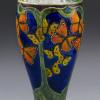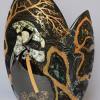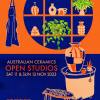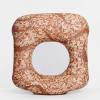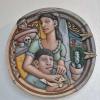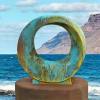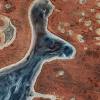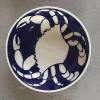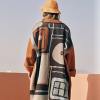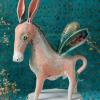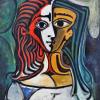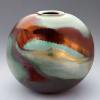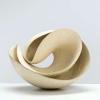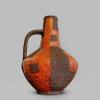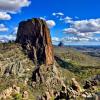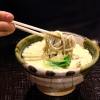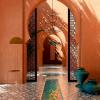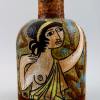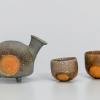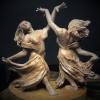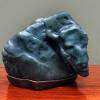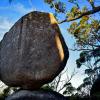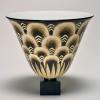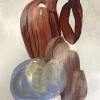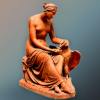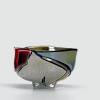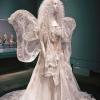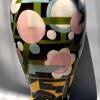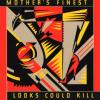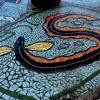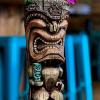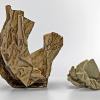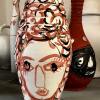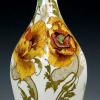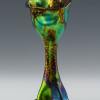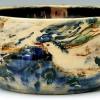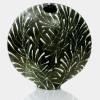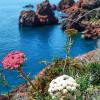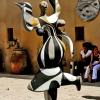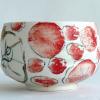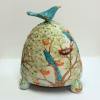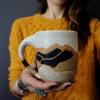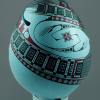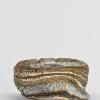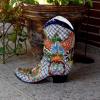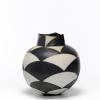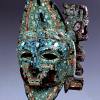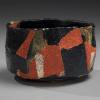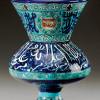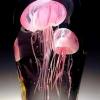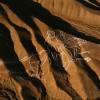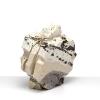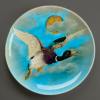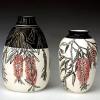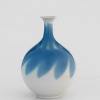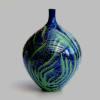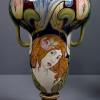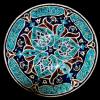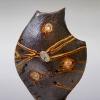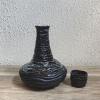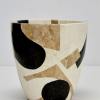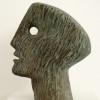The Italian ceramic arts of Fausto Melotti, Michele Fabbricatore and Fausto Salvi :
Several generations of ceramicists who encapsulate the freedom, spontaneity and flair of the Italian aesthetic.
‘La Pittura ‘ – Fausto Melotti
Fausto Melotti
Fausto Melotti was born into a musical family and he initially studied physics, mathematics and electrical engineering. In 1928, at the age of 27, he enrolled in the Accademia di Belle Arti di Brera in Milan, where he trained alongside Fontana with the sculptor Adolfo Wildt. Melotti’s first experiences as a ceramist occurred in 1929 after meeting the renowned architect, designer, writer, and ceramics enthusiast, Gio Ponti, who at that time was the artistic director for the Ricardo Ginori ceramic and porcelain manufactory. Melotti assisted Ponti with the execution of several of his designs, and the collaboration marked the beginning of his twenty-year relationship with the firm. While he would continue to work with ceramics for his entire career, his most concentrated involvement with the medium came in the aftermath of World War II. After discovering that his studio had been destroyed in the bombardment of Milan, he renewed his practice by renting out a kiln, thus initiating a fifteen-year period in which he only produced ceramics and terracotta sculptures.
Melotti was recognized, both nationally and internationally, as his contemporaries Alexander Calder, Alberto Giacometti, Louise Bourgeois and Lucio Fontana, as a key figure in the field of modern and contemporary sculpture, being distinguished for having been, from the beginning of the 30’s, a significant contributor in the renewal and development of the plastic language and its materials. Using terracotta, faience and plaster sculptures in mixed media including iron, ceramic and stainless steel works, drawings and sketches, the sculptural path 0f Fausto Melotti was closely linked to the world of visual arts. He merged the classical traditions with the trends of the European avant-garde, mixing disparate strains of 20th-century Italian art from Futurist modernity to the metaphysical elements of the Surrealists.
Fausto Melotti in his studio in Milan, 70’s
Photo Ugo Mulas
Contrapunto VIII – Fausto Melotti
-1971-
Fausto Melotti – Copetta
1950
Female sculpture – Fausto Melotti
Fausto Melotti – ‘Peacock Vase’
1960
‘Coppa con orlo mosso’ – Fausto Melotti
1955
El almacen de ideas – Fausto Melotti
1980
Fausto Melotti – ‘Cavaliere’
c 1945
Fausto Melotti photo by Ugo Mulas
Vaso Ceramica Fausto Melotti
‘Heretics and Saints and Bishops’ — 1952 by Fausto Melotti
A Teatrini representing a miniature “theater” – small and condensed worlds that use abstract and figurative elements to convey narratives. Melotti’s miniature theatres tended to retain a sense of ambiguity and challenge the viewer to construct the drama.
Fausto Melotti,- Vaso Civetta
28 inches height
circa 1965
‘Leone’ — Fausto Melotti
circa 1975
Fausto Melotti vase
Kore by Fausto Melotti
1954
Fausto Melotti modernist vase
Sculptured goblet – Fausto Melotti
‘Noche Africana’ – Fausto Melotti
Melotti’s free standing metal sculptures favoured minimal lines sparsely interspersed with various motifs.
1973
ψ
Fausto Salvi
Fausto discovered ceramics in the late 80’s, attending courses at the State Institute of Art of Ceramics in Faenza. ” When I began to work in ceramics, drawing was all-important for me. I enjoyed drawing on the white surface of majolica, being smooth and absorbent. I used to inscribe any surface it offered, plates, cylinders, jugs, vases. Any shape responded to my need to express myself through my drawings. Only later did I learn to communicate through shape and volume, I began to study the expressive possibilities of clay and modeling, more carefully. At the same time I began to think about the surfaces of my pieces as abstract textures and I started to use pure pigment. As I have worked in different series; I have never wanted to concentrate on only one of the elements I was exploring. The presence or absence of drawing has enabled me to communicate very different feelings and messages.”
During an exhibition of Australian contemporary ceramics at the Faenza Museum in the 90’s, Fausto was struck by how the absence of cumbersome traditions was really an advantage in terms of lightness and spontaneity. Some of his pieces, like Melotti, show hints of classical influence, but most are refreshingly original and visually engaging.
‘Down’ – Fausto Salvi
2006
Fausto Salvi – Coppia
‘Grottesco’ – Fausto Salvi
‘A Big Surprise’ – Fausto Salvi
– painted ceramic covered by aluminium foils
2009
Contemporary vase – Fausto Salvi
‘Vegetale’
Fausto Salvi sculpture from the Ten Year’s After exhibition in Milan, 2013
Fausto Salvi with Magic Wood ceramic sculpture
2009
‘Magic Wood’ (Bosco Magico) – painted ceramic covered with aluminium foils – Fausto Salvi
max height : 370 cm – max diameter : 45 cm
Contemporary sculpture “Greenhouse” – referring to a green house in Milan where Fausto lived that was swallowed up by urban development.
2013
‘Bella ‘ – Fausto Salvi
‘Korea’ – Fausto Salvi
2012
‘All I Have To Say’ – Fausto Salvi
– glazed ceramic with gold, NY 2006
Fausto Salvi – ceramic bas relief
Greenhouse exhibition
‘le Belle’ – Fausto Salvi
Fausto Salvi puzzle bas relief
‘One Way’ – Fausto Salvi
2006
Fausto Salvi exhibition
Ψ
Michele Fabbricatore :
In 1992 at age of 20 MicheleI won a scholarship to do a pottery internship for three months in Maastricht in the Netherlands. In 1993 he began studying at the Academy of Fine Arts in Florence.
” My work is a large cauldron of everything that I like and I’m passionate about: Calvin Orlando Furioso, from fairy tales to mythology, all revisited and reinterpreted with an eye for the ironic and surreal. My mission is to retrieve the most authentic part of me and see with a child’s unconditioned perception, which looks at the world with awe and wonder. And to relive the gift of enchantment that governs all beauty. Feeding this treasure that we all have within, with a desire and a commitment in my life where I hope these values become conveyed through my work.”
Michele Fabbricatore reclining Mermaid
‘San Giorgio e il Drago’ – Michele-Fabbricatore
‘Adamo ed Eva’ – Michele Fabbricatore
Michele Fabbricatore
Arca – Michele Fabbricatore
Michele Fabbricatore
Angelica inseguita – Michele Fabbricatore
Marco Polo – Michele Fabbricatore
Europa e Zeus – Michele Fabbricatore
Michele Fabbricatore
Alice – Michele Fabbricatore
Angelo – Michele Fabbricatore
Cavallo di Troia – Michele Fabbricatore
Michele Fabbricatore abstract figurative sculpture
‘Re e Regina’ – Michele Fabbricatore
Dedalo e Icaro by Michele Fabbricatore
ψ
Michele Fabbricatore website here






















































